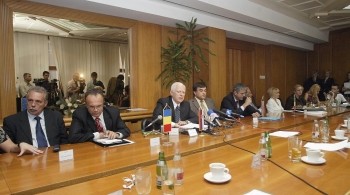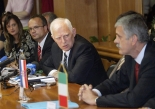- Serbia
Get to know Serbia
- Citizens
Culture and science
Health services
Pension and disability insurance
- Business
Employment
Economy
- Media
- Government
- Contact
Keep in touch
Contact form
Back
Keepin touch
Whether you have a question, comment, suggestion or any problem in the purview of the government, send us your message and we will try to respond as soon as possible. If your problem is not in our purview, we will forward your message to the relevant institution.
Q:
A:
Long term agreements on construction of Pan-European oil pipeline
Belgrade,
4 June 2008
Serbian Assistant Minister of Energy Slobodan Sokolovic said today that the construction of the Pan-European oil pipeline will be made possible by signing long term agreements on the use of the pipeline, on which intensive work will be done during the next few years, while Serbia presides over the Interstate Committee for construction of the Pan-European oil pipeline.
Speaking at a press conference held following a meeting of the Interstate Committee, in which representatives of Croatia, Italy, Romania, Serbia and Slovenia took part, Sokolovic said that the construction of the Pan-European oil pipeline does not pose financial problems, since the project is attractive and funding is not difficult.
According to Sokolovic, the part of the pipeline to be built in Serbia will be nearly 300 kilometres long, and according to feasibility studies carried out to date, the corridor will pass through the autonomous province of Vojvodina.
Sokolovic said that the construction of the oil pipeline will be advantageous to domestic refineries, since it will be possible to get an oil supply from two routes.
He said that Italy has now officially confirmed support to the project and taken over obligations, while the position of Slovenia is rather different, since the country has until now actively monitored the project, but has still not made a final decision whether to participate in the project.
Representative of the Croatian Ministry of Economy Damir Stambuk said that Croatia supported the project from the very beginning and actively participated in the work of the Interstate Committee, since diversification of supply routes is very important for Croatia.
It is also in our interest to secure a stable supply source for our refineries, as well as the fact that the pipeline will end in Italy and will be connected to the Italian oil pipeline, said Stambuk.
An agreement was signed in Bucharest at the end of April on the forming of an association of the companies from Romania, Serbia and Croatia which will participate in construction of the pipeline.
Agreement was also reached on founding a development company in London to implement the project, and according to statements by participants of today’s meeting the company will be registered within 10 days.
The construction of the Pan-European oil pipe line, whose annual capacity is estimated at 60–90 million tones, is to cost around $3.5 billion, and the cost of the section passing through Serbia will amount to around $300 million.
The pipe line will transfer oil from the eastern zone of the Black Sea to the European market.
Last April, a ministerial declaration was signed in Zagreb, in which states, through which the pipe line will traverse, voiced their political support to the project.
The 1,400 kilometre long Pan-European oil pipe line will pass through Romania, Serbia, Croatia and Slovenia, and finally reach Italy.
Shareholders in the newly-formed company for the development of this project will be authorised companies from countries through which the pipe line will traverse. Serbia’s representative is the company Transnafta.
According to Sokolovic, the part of the pipeline to be built in Serbia will be nearly 300 kilometres long, and according to feasibility studies carried out to date, the corridor will pass through the autonomous province of Vojvodina.
Sokolovic said that the construction of the oil pipeline will be advantageous to domestic refineries, since it will be possible to get an oil supply from two routes.
He said that Italy has now officially confirmed support to the project and taken over obligations, while the position of Slovenia is rather different, since the country has until now actively monitored the project, but has still not made a final decision whether to participate in the project.
Representative of the Croatian Ministry of Economy Damir Stambuk said that Croatia supported the project from the very beginning and actively participated in the work of the Interstate Committee, since diversification of supply routes is very important for Croatia.
It is also in our interest to secure a stable supply source for our refineries, as well as the fact that the pipeline will end in Italy and will be connected to the Italian oil pipeline, said Stambuk.
An agreement was signed in Bucharest at the end of April on the forming of an association of the companies from Romania, Serbia and Croatia which will participate in construction of the pipeline.
Agreement was also reached on founding a development company in London to implement the project, and according to statements by participants of today’s meeting the company will be registered within 10 days.
The construction of the Pan-European oil pipe line, whose annual capacity is estimated at 60–90 million tones, is to cost around $3.5 billion, and the cost of the section passing through Serbia will amount to around $300 million.
The pipe line will transfer oil from the eastern zone of the Black Sea to the European market.
Last April, a ministerial declaration was signed in Zagreb, in which states, through which the pipe line will traverse, voiced their political support to the project.
The 1,400 kilometre long Pan-European oil pipe line will pass through Romania, Serbia, Croatia and Slovenia, and finally reach Italy.
Shareholders in the newly-formed company for the development of this project will be authorised companies from countries through which the pipe line will traverse. Serbia’s representative is the company Transnafta.
-
 Belgrade, 22 January 2025
Belgrade, 22 January 2025Egypt one of Serbia’s closest partners on international stage
-
 Belgrade, 9 July 2024
Belgrade, 9 July 2024Support for 104 associations in diaspora that preserve Serbian language, culture
-
 Belgrade, 15 April 2024
Belgrade, 15 April 2024Competition for StarTech grants open until 31 May
-
 Belgrade, 2 October 2023
Belgrade, 2 October 2023Serbia respects Resolution 1244 and will do everything to preserve peace
-
 Belgrade, 13 September 2023
Belgrade, 13 September 2023Day of Serbian Unity to be celebrated outside borders of Serbia, Republika Srpska for the first time
-
 Belgrade, 8 August 2023
Belgrade, 8 August 2023RSD 24.2m in state aid paid out to citizens affected by storm
-
 Belgrade, 17 June 2023
Belgrade, 17 June 2023Belgrade is doing everything to preserve peace in Kosovo and Metohija
-
 Belgrade, 15 June 2023
Belgrade, 15 June 2023Slovenia will continue to support Serbia on its way to EU
-
 Belgrade, 5 May 2023
Belgrade, 5 May 2023Emergency measures, tightening of conditions for possessing weapons
-
 Belgrade, 3 May 2023
Belgrade, 3 May 2023Three days of mourning in Serbia over tragedy at Vladislav Ribnikar primary school


